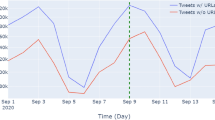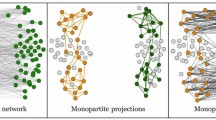Abstract
We investigate the link sharing behavior of Twitter users following the temporary halt of AstraZeneca COVID-19 vaccine development in September 2020. During this period, we show the presence of malicious and low credibility information sources shared on Twitter messages in multiple languages. The malicious URLs, often in shortened forms, are increasingly hosted in content delivery networks and shared cloud hosting infrastructures not only to improve reach but also to avoid being detected and blocked. There are potential signs of coordination to promote both malicious and low credibility URLs on Twitter. Our findings suggest the need to develop a system that monitors the low-quality URLs shared in times of crisis.
Access this chapter
Tax calculation will be finalised at checkout
Purchases are for personal use only
Similar content being viewed by others
References
Nasn 2021: Grand challenge. https://www.insna.org/nasn-2021-grand-challenge
Spanish-language vaccine news stories hosting malware disseminated via url shorteners. https://fas.org/disinfoblog/spanish-language-vaccine-news-stories-hosting-malware-disseminated-via-url-shorteners/
Alexa Top 1M (2019). https://www.alexa.com/topsites. Accessed 1 Dec 2019
Media bias/fact check - search and learn the bias of news media (2020). https://mediabiasfactcheck.com/
Us won’t rely on UK for Covid vaccine safety tests, says Nancy Pelosi (2020). https://www.theguardian.com/society/2020/oct/09/us-wont-rely-on-uk-for-covid-vaccine-safety-tests-says-nancy-pelosi
Coronavirus misinformation tracking center (2021). https://www.newsguardtech.com/coronavirus-misinformation-tracking-center/
Covid-19 vaccine astrazeneca roller-coaster ride (2021). https://www.reuters.com/business/healthcare-pharmaceuticals/covid-19-vaccine-astrazeneca-roller-coaster-ride-2021-03-24/
Bagherpour, A.: Covid misinformation is killing people (2020). https://www.scientificamerican.com/article/covid-misinformation-is-killing-people1/
Cyranoski, D., Mallapaty, S.: Scientists relieved as coronavirus vaccine trial restarts-but question lack of transparency. Nature 585(7825), 331–332 (2020)
Farsight Security: DNS Database. https://www.dnsdb.info/. Accessed: 10 Jan 2021
Ferrara, E., Cresci, S., Luceri, L.: Misinformation, manipulation, and abuse on social media in the era of Covid-19. J. Comput. Soc. Sci. 3(2), 271–277 (2020)
Horawalavithana, S., Ng, K.W., Iamnitchi, A.: Twitter is the megaphone of cross-platform messaging on the white helmets. In: Thomson, R., Bisgin, H., Dancy, C., Hyder, A., Hussain, M. (eds.) SBP-BRiMS 2020. LNCS, vol. 12268, pp. 235–244. Springer, Cham (2020). https://doi.org/10.1007/978-3-030-61255-9_23
Latapy, M., Magnien, C., Del Vecchio, N.: Basic notions for the analysis of large two-mode networks. Soc. Networks 30(1), 31–48 (2008)
Lui, M., Baldwin, T.: langid.py: an off-the-shelf language identification tool. In: Proceedings of the ACL 2012 System Demonstrations, pp. 25–30 (2012)
Newman, M.E.: The structure and function of complex networks. SIAM Rev. 45(2), 167–256 (2003)
Pacheco, D., Hui, P.M., Torres-Lugo, C., Truong, B.T., Flammini, A., Menczer, F.: Uncovering coordinated networks on social media. arXiv:2001.05658 (2020)
PNNL, P.N.N.L: Socialsim (2018). https://github.com/pnnl/socialsim
Robbins, R., Feuerstein, A., Branswell, H.: Astrazeneca Covid-19 vaccine study is put on hold (2020). https://www.statnews.com/2020/09/08/astrazeneca-covid-19-vaccine-study-put-on-hold-due-to-suspected-adverse-reaction-in-participant-in-the-u-k/
Silva, R.D., Nabeel, M., Elvitigala, C., Khalil, I., Yu, T., Keppitiyagama, C.: Compromised or attacker-owned: a large scale classification and study of hosting domains of malicious urls. In: 30th USENIX Security Symposium (USENIX Security 21). USENIX Association (2021). https://www.usenix.org/conference/usenixsecurity21/presentation/desilva
Singh, L., Bode, L., Budak, C., Kawintiranon, K., Padden, C., Vraga, E.: Understanding high-and low-quality URL sharing on Covid-19 twitter streams. J. Comput. Soc. Sci. 3(2), 343–366 (2020)
Smith, R., Cubbon, S., Wardle, C.: Under the surface: Covid-19 vaccine narratives, misinformation and data deficits on social media (2020). https://firstdraftnews.org/long-form-article/under-the-surface-covid-19-vaccine-narratives-misinformation-and-data-deficits-on-social-media/
VirusTotal, Subsidiary of Google: VirusTotal - Free Online Virus, Malware and URL Scanner. https://www.virustotal.com/. Accessed 14 Jan 2021
Acknowledgements
This work is partially supported by the DARPA SocialSim Program and the Air Force Research Laboratory under contract FA8650-18-C-7825. The authors would like to thank Grand Challenge, North American Social Network Conference for providing data.
Author information
Authors and Affiliations
Corresponding author
Editor information
Editors and Affiliations
Rights and permissions
Copyright information
© 2021 Springer Nature Switzerland AG
About this paper
Cite this paper
Horawalavithana, S., De Silva, R., Nabeel, M., Elvitigala, C., Wijesekara, P., Iamnitchi, A. (2021). Malicious and Low Credibility URLs on Twitter During the AstraZeneca COVID-19 Vaccine Development. In: Thomson, R., Hussain, M.N., Dancy, C., Pyke, A. (eds) Social, Cultural, and Behavioral Modeling. SBP-BRiMS 2021. Lecture Notes in Computer Science(), vol 12720. Springer, Cham. https://doi.org/10.1007/978-3-030-80387-2_1
Download citation
DOI: https://doi.org/10.1007/978-3-030-80387-2_1
Published:
Publisher Name: Springer, Cham
Print ISBN: 978-3-030-80386-5
Online ISBN: 978-3-030-80387-2
eBook Packages: Computer ScienceComputer Science (R0)




